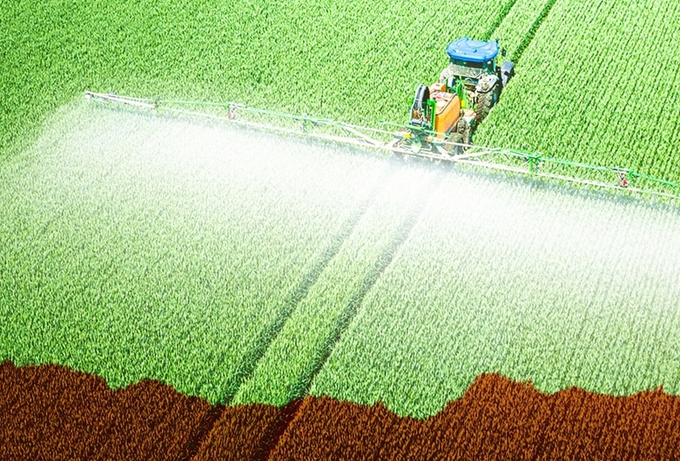November 24, 2025 | 19:28 GMT +7
November 24, 2025 | 19:28 GMT +7
Hotline: 0913.378.918
November 24, 2025 | 19:28 GMT +7
Hotline: 0913.378.918

Farmers all over the world count on a commodity that is increasingly expensive and hard to get. Photo: Grid
A leading expert in global agricultural metrics and data analysis sees a continuing crisis in fertilizer availability and supply, just at a time when Chinese demand is growing significantly and adding demand shocks to an already strained global good system.
Sarah Menker spoke Sept. 15 in St. Louis at the annual conference of Mississippi River Cities and Towns Initiative, an organization of mayors of Mississippi River cities and towns from Bemidji, Minnesota, to the mouth, that advocates for basin-wide solutions. Menker was a Wall Street energy trader before she left to found her own start-up consulting business, Gro Intelligence. She said she wanted to apply the risk-reduction and data analysis techniques used by traders to address the problems of world hunger and the global food supply. Gro Intelligence has built an engine that aggregates publicly available data from public and private sources, including satellite data, around the world and “de-siloes” it to aggregate and work across a common platform.
Gro Intelligence’s clients include corporations such as food companies; hedge funds and investors looking to analyze risk, and public sector agencies. Menker called Gro Intelligence’s products “data from our earth to our markets,” and said the system had generated 2 million separate models so far.
Menker noted that since the beginning of COVID, the world has seen a steady rise in the prices of all agricultural commodities. Russia’s invasion of Ukraine and the severe drought this summer were extra layers on an already-existing food production crisis. Gro Intelligence has developed a United States food price index tool that looks at a typical “grocery basket” of foods across all sectors—grains, vegetables and proteins— that excludes energy as a component. It also has produced a global drought index, the only one available. Menker said 30% of the entire northern hemisphere was in drought this summer.
Gro Intelligence is also using its data to look at natural gas, a key feedstock of nitrogen fertilizer, to parse trends in fertilizer production and prices, and therefore on crop yields. Thanks to Russia’s actions, it now costs $2,800 a ton to produce fertilizer within the European Union—leading to the shutdown of most nitrogen fertilizer production there, as this cost makes it uneconomic to produce, she said. Menker revealed that the outlook for fertilizer availability is now worse than the worst-case scenarios produced by Gro Intelligence in August.
Structural changes in food demand from China are adding demand shocks to supply shocks. During the COVID shutdown, China became a net grain importer, and Gro Intelligence’s models foresee an increase in Chinese demand of 3%, or about 15 million tons of corn and beans a year.
Gro Intelligence also built a series of Climate Risk Navigators that can aggregate data to zoom in on particular assets to determine their degree of climate risk. Originally developed to track farmland usage across the globe, the app can be applied to other assets. Menker showed how it can apply to bridges across the Mississippi River, comparing trend data on average rainfall with the degree of bridge vulnerability to breakdown to arrive at a climate risk assessment for each bridge and region.
During the discussion that followed, mayors and speakers agreed that the Mississippi Valley basin is the most important food-producing river basin in the world and will only become more so in the years ahead. As MRCTI executive director Colin Wellenkamp pointed out, it’s the world’s only major river basin that is a consistent net exporter of both food and energy, except for the Parana in South American and, at times, the Nile.
(hpj.com)

(VAN) Brazil's COP30 presidency pushed through a compromise climate deal on Saturday that would boost finance for poor nations coping with global warming but that omitted any mention of the fossil fuels driving it.

(VAN) Poultry farmers in the UK have been warned that they could face one of the worst winters yet for bird flu.

(VAN) Prices of main-crop paddy have risen sharply, with jasmine rice hitting 16,100 baht per tonne — the highest level in years.

(VAN) In Brazil, FAO unveiled a series of reports and initiatives showing how sustainable agrifood systems are a solution to the climate crisis.

(VAN) With names like neodymium and dysprosium, rare-earth elements sound exotic — and their perceived scarcity has only added to the mystique.

(VAN) In a new study published in Trends in Biotechnology, researchers used a gene-editing technology called CRISPR to increase a fungus's production efficiency and cut its production-related environmental impact by as much as 61%- all without adding any foreign DNA.

(VAN) A top official in Beijing’s Cop delegation says China is committed to clean energy – but US’s absence is a problem.